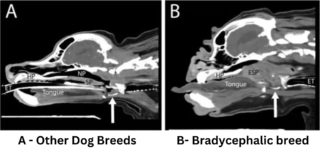Understanding Brachycephalic Breeds

Addressing Their Unique Challenges and Care
Brachycephalic breeds, characterised by their short skulls and flat faces, include popular dogs like Bulldogs, Pugs, French bulldog and Boston Terriers. While these breeds are adored for their unique appearances and charming personalities, they often face significant health challenges related to their anatomy. This blog explores the issues faced by brachycephalic dogs and how we can help them through both surgical options and effective home management.
Common Issues in Brachycephalic Breeds
-
Brachycephalic Obstructive Airway Syndrome (BOAS):
Many brachycephalic dogs suffer from this condition, which can lead to breathing difficulties. Symptoms include noisy breathing, snoring, excessive panting, and difficulty exercising, regurgitation and restless sleep.

-
Dental Problems:
Their shortened jaws can lead to overcrowded teeth, resulting in dental issues such as periodontal disease.
-
Eye Problems:
Due to their prominent eyes and short muzzles, brachycephalic breeds are at higher risk for eye injuries and conditions like corneal ulcers, cherry eye and entropian is a condition in which the eyelid rolls inward, causing the eyelashes and surrounding hair to rub against the dog’s sensitive corne or ectropian is a condition in which eyelid appears like it is sagging away from their eye rather than resting against it.
-
Heat Sensitivity:
These dogs can struggle with thermoregulation due to their breathing issues, making them more susceptible to heatstroke in warm weather.
-
Skin Fold Dermatitis:
Many brachycephalic breeds have loose skin that can trap moisture and debris, leading to skin infections and irritations.
-
Tail Abnormalities:
Some brachycephalic breeds, particularly Bulldogs and Pugs, may have corkscrew or tightly curled tails, also if they have loose skin around their tails can develop tail pockets, which can trap moisture and debris, leading to infections or dermatitis.
-
Intervertebral Disc Disease (IVDD):
This occurs when the discs between the vertebrae degenerate, potentially leading to pain, nerve damage, or paralysis.
-
Spinal Issues:
Brachycephalic dogs are also prone to spinal problems,
including:- Spondylosis: This degenerative condition affects the vertebrae, leading to pain and stiffness.
- Lumbar Disc Disease: Similar to IVDD, this affects the lower back and can lead to pain and mobility issues.
9. Orthopaedic Problems:
Brachycephalic breeds are also at a higher risk for orthopaedic issues, which can further complicate their health:
-
-
- Hip Dysplasia: This genetic condition involves the malformation of the hip joint, leading to arthritis and pain. Keeping your dog at a healthy weight and engaging in low-impact exercises can help manage this condition.
- Patellar Luxation: Commonly known as “slipped kneecaps,” this condition occurs when the patella (kneecap) dislocates from its normal position. It can cause limping and pain, especially during physical activity.
- Elbow Dysplasia: This condition involves the abnormal development of the elbow joint, leading to arthritis and discomfort.
- Osteochondritis Dissecans (OCD): This is a joint disorder where cartilage does not form properly, leading to pain and potential joint issues, particularly in the shoulders and elbows.
-
Helping Brachycephalic Breeds
Surgical Options
For many brachycephalic breeds, surgical intervention can be a viable solution to alleviate some of their health challenges:
- Soft Palate Resection: This procedure removes excess tissue from the soft palate to improve airflow and reduce breathing difficulties.
- Nasal Turbinates Reduction: In this surgery, the nasal turbinates are reduced to increase airflow through the nasal passages, making it easier for the dog to breathe.
- Laryngeal Saccullectomy: In cases of severe airway obstruction, removing the laryngeal saccules can help open the airway.
- Tonsillectomy: is a surgical procedure in which the tonsils, located at the back of the throat, are removed. In brachycephalic dogs, enlarged tonsils can contribute to airway obstruction, making it difficult for them to breathe comfortably. By removing the tonsils, the airway can be widened, leading to improved respiratory function.
- Eye Surgery: For dogs with severe eye problems, surgical interventions like eyelid tacking can help prevent further injuries and complications.
Consulting with a veterinary surgeon is crucial to determine the best course of action.

Home Management Strategies
In addition to surgical options, there are several effective ways to manage the health of brachycephalic breeds at home:
- Weight Management: Keeping your dog at a healthy weight is vital. Obesity can exacerbate breathing difficulties. A balanced diet and regular exercise are essential, but avoid strenuous activities, especially in hot weather.
- Temperature Control: Ensure your home environment is cool and well-ventilated. Use fans or air conditioning during hot months and limit outdoor activities during peak heat.
- Regular Vet Check-ups: Schedule routine veterinary visits to monitor your dog’s health. Early detection of issues can lead to more effective treatment.
- Dental Care: Regular dental check-ups and cleanings are essential. Use dental chews or toys to help keep their teeth clean.
- Eye Care: Keep an eye on your dog’s eyes for signs of irritation or injury. Use lubricating eye drops if recommended by your vet, and wipe away any discharge gently with a clean, damp cloth.
- Skin Care: Regularly clean skin folds to remove moisture and debris. Keeping these areas dry can help prevent infections.
- Training and Behaviour: Train your dog to be calm and relaxed, particularly in stressful situations. Reducing anxiety can help lower the risk of breathing issues.
Conclusion
Brachycephalic breeds are beloved companions, but they require special attention to address their unique health challenges. By understanding the issues they face and implementing effective management strategies—both surgical and at home—you can enhance their quality of life.
Regular veterinary care and proactive measures will go a long way in ensuring that your brachycephalic dog remains happy, healthy, and by your side for years to come!
Book an Appointment Today
Whether you’re looking for advice, reassurance, or a little extra guidance, the Clyde Veterinary Team is here to support you and your furry family members every step of the way. Reach out to us for expert care tailored to keep your pets happy, healthy, and thriving.
About the Author:
Dr. Irene Mitry is the owner and founder of Clyde Veterinary Hospital, and a vet with a difference. She has not one, but two veterinary degrees, and an abiding passion for preventative pet care. Her life-long love for our animal friends shines through in everything she does, as her client testimonials show. Dr Mitry’s long-standing desire to bring this philosophy of care to life in her own purpose-built veterinary clinic led her to found Clyde Veterinary Hospital in 2018.



